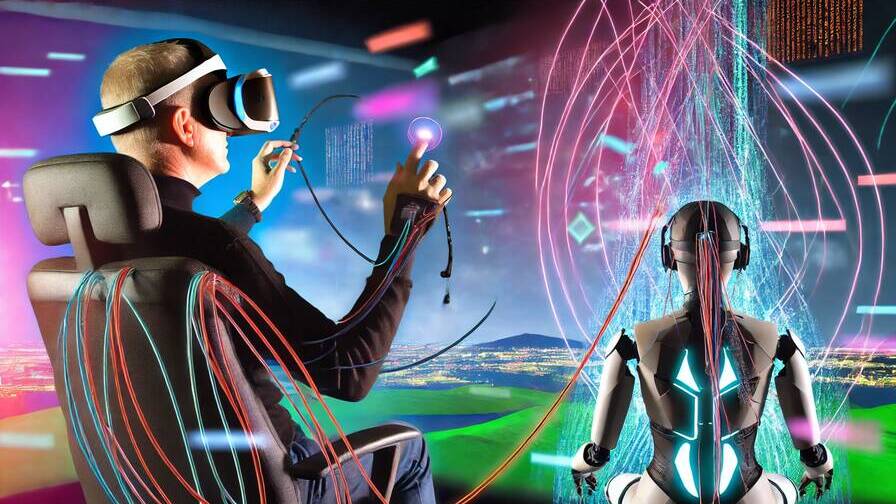The Emergence of Simulation Theory
- by Adrian Blackwood
- Jun 10
- Literature & Culture

Back in 1999 the Wachowski siblings unveiled The Matrix a creation portraying a future where mankind is trapped in a computer generated world crafted by intelligent machines to control human beings. While initially seen as advancements in artificial intelligence and virtual reality in recent years have sparked renewed conversations about the feasibility of such a scenario. Presently the notion that our reality could be a construct referred to as Simulation Theory has not captured attention in mainstream media but also within intellectual circles and philosophical discourse.
Exploring The Matrix; Origins in Fiction
The Matrix narrates the story of Neo, a hacker who uncovers that his perceived reality is nothing but a simulation devised by AI to dominate humanity. This profound realization metaphorically symbolizes awakening to truths. Challenging the essence of existence. The film’s portrayal of a fabricated reality was revolutionary merging cyberpunk elements with inquiries, into perception, consciousness and autonomy.
Transitioning from Sci Fi to Scholarly Dialogue
At its core, the concept explored in "The Matrix”, about our reality potentially being a simulated construct shares similarities with Simulation Theory. This theory proposes that our perceived reality might actually be a simulation created by an advanced civilization. It gained attention when philosopher Nick Bostrom presented his paper "Are You Living in a Computer Simulation?" back in 2003. Bostrom suggested that one of the following statements is likely true;
- Most civilizations like ours tend to die out before reaching maturity.
- The number of civilizations interested in creating ancestor simulations is close to zero.
- It's highly probable that we are currently living within a computer generated simulation.
Bostrom's argument centers on the notion that if an advanced civilization has the capability to create simulations and desires to do the sheer quantity of these simulations could be vast. Therefore, the chances of us existing in the reality rather than one among numerous simulations become minuscule.
Supporting Evidence from Progress
Technological advancements provide support for Simulation Theory;
-
Artificial Intelligence (AI): AI technology has come a way with machine learning algorithms surpassing capabilities in certain tasks and neural networks mimicking aspects of human thinking. These advancements hint at the potential, for developing simulations.
-
Virtual Reality (VR) and Augmented Reality (AR) have progressed to offer experiences that blur the boundaries between reality and the virtual world. While current VR encounters still have differences from life ongoing progress could result in simulations that closely mirror our actual experiences.
-
The concept of Moore's Law, which forecasts the growth of computing power suggests that future computers may have the ability to simulate universes right down to the quantum level. Quantum computing specifically shows promise for boosting capabilities.
Are We Living in a Simulation?
Examining whether we exist within a simulation sparks debates with arguments both for and against this hypothesis.
Pros
- Consistency with Technological Trends: The rapid advancement of computing technology and AI supports the possibility that future civilizations could create realistic simulations.
- Philosophical Alignment: Simulation Theory addresses fundamental questions about existence and consciousness, aligning with philosophical inquiries into the nature of reality.
- Empirical Observations: Some physicists and cosmologists note that certain features of our universe, such as the fine-tuning of physical constants, might be more easily explained if we are living in a designed simulation.
Cons
- Lack of Empirical Evidence: Despite theoretical arguments, there is no direct empirical evidence supporting Simulation Theory. Our observations of the universe have not yet revealed glitches or anomalies that would indicate a simulated reality.
- Technological Hurdles: Creating a simulation as detailed and complex as our universe would require computational resources far beyond what we currently possess. The energy and information processing demands might be insurmountable.
- Philosophical Counterarguments: Some philosophers argue that Simulation Theory is unfalsifiable and thus not a scientifically rigorous hypothesis. It also raises questions about the nature of the simulators and their motives, which remain speculative.
Conclusion
The idea that we might be living in a simulation, once relegated to the realm of science fiction, has gained serious consideration in scientific and philosophical circles. While The Matrix provided a captivating narrative exploring this concept, real-world technological advancements have made the hypothesis more plausible. Despite compelling arguments and intriguing possibilities, the question remains open, with significant pros and cons to consider. Whether or not we are living in a simulation, exploring this theory challenges us to think deeply about the nature of reality, technology, and our place in the universe.
References
- Bostrom, Nick. “Are You Living in a Computer Simulation?” Philosophical Quarterly, 2003.
- Wachowski, Lana, and Lilly Wachowski, directors. The Matrix. Warner Bros., 1999.
- Chalmers, David J. “The Matrix as Metaphysics.” In Philosophers Explore The Matrix. Oxford University Press, 2005.